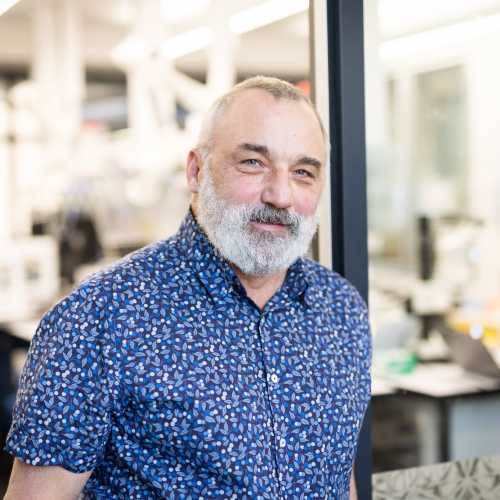
Robert is the inaugural Professor of Biofabrication and Tissue Engineering at RMIT, holds an adjunct honorary appointment as Head of Research at the Department of Neuroscience, St Vincent's Hospital Melbourne and has supervised 16 PhD and 14 post graduate students to completion.
Robert received his PhD in 1996 on mitochondrial polymorphisms in human disease and has 131 peer-reviewed publications. His team pioneered first generation gene editing technologies as part of a worldwide consortium and were among the first to carry out in vivo gene editing of the dystrophin mutation in muscle of the mdx mouse model of Duchenne muscular dystrophy.
Robert’s research into autologous regenerative cell therapies for neuromuscular diseases has directly contributed to the establishment of the Melbourne Neuromuscular Research Institute-SVHM and National Muscular Dystrophy Research Centre-Howard Florey/Murdoch Institutes and three major multi-centre programs (Bionic Technologies Australia; ARC Centre for Electromaterials Science, ACES I and II), where he held scientific, executive and governing board responsibilities.

Mahyar is an internationally recognised additive manufacturing (3D printing) research leader, who has completed a PhD and five fellowships in 3D printing for different industries such as Airbus, Boeing and Ford in Australia, the Netherlands and Germany.
He is currently a Senior Research Fellow at RMIT and a key researcher on a collaborative project between Ford Motor Company and RMIT, where he is developing first-in-world simulation techniques for multi jet fusion-based additive manufacturing.

Laura is a sessional teacher at RMIT, and an interdisciplinary researcher concerned with the intersection of markets, inequality and violence against women, with a particular expertise in online forms of the sex trade including the evolving pornography market. Laura has presented her work on the pornography market, digital platforms, and women’s inequality to diverse international audiences, across the fields of business, consumer culture, and public policy.
Since completing her PhD, Laura has been able to apply her academic, industry and community engagement experience to her work at the eSafety Commission, where she develops research, policy, and strategic partnerships in the prevention of technology-facilitated abuse and violence against women online.

Annan is Professor at RMIT, obtaining his PhD degree in Geotechnical Engineering from the University of Newcastle in 2011. His major research area includes advanced laboratory testing and constitutive/numerical modelling of multi-phase porous media such as unsaturated soils. He has published over 250 journal papers and has supervised 11 HDRs to their successful completions at RMIT.
He was the RMIT University Research Committee Board Member and the RMIT ERA Advisor for several research areas and is now the HDR manager for Civil Engineering – managing one of the largest HDR programs in RMIT with more than 140 HDRs. In addition, he serves as the Vice President for the International Society of Environmental Geotechnology (2020-2025) and holds editorial roles for seven highly reputed international journals.
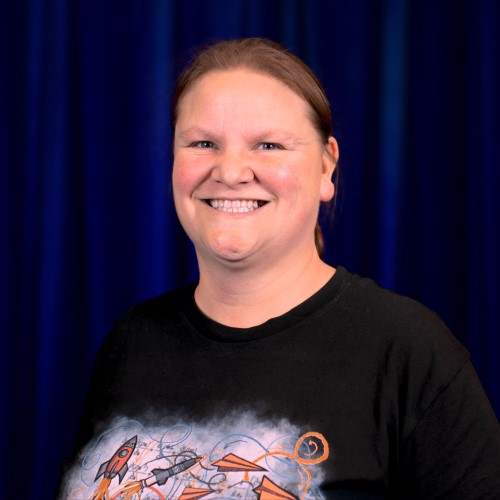
Kate is currently the Associate Dean (Higher Degrees by Research) in the School of Engineering.
She has been fortunate enough to work on several high impact projects such as the bionic eye, personalised orthopaedic implants, epilepsy solutions and now in collaboration with the Australian Stroke Alliance she is developing a new LiteCT for the detection and treatment of stroke in remote communities.
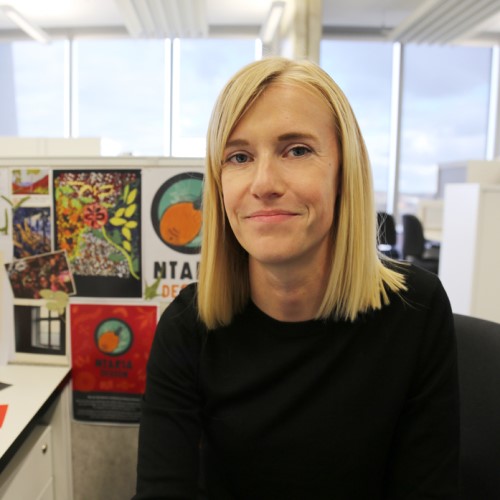
Since joining RMIT in 2020 as a lecturer, Communication Design, Nicola has worked in collaborative partnership with First Nations creatives, community schools and design organisations. These participatory research projects have fostered social and cultural wellbeing.
Her work has created significant impact within Australia’s design industry, culturally safe employment opportunities for First Nations artists, and a major milestone for protecting Indigenous cultural and intellectual property within design and digital spaces. Nicola continues to build on her international reputation for working in ethical and meaningful ways alongside First Nations creatives and communities.

Sara is a doctoral candidate in the field of gender, business and human rights at the RMIT School of Management. Her research focuses on gender in global production networks, with an emphasis on women workers in the garment industry.
She has also presented insightful data and participant-level stories about the situation for garment workers in Myanmar at several national and international conferences, and her work has been recognised in media outlets such as the New York Times.
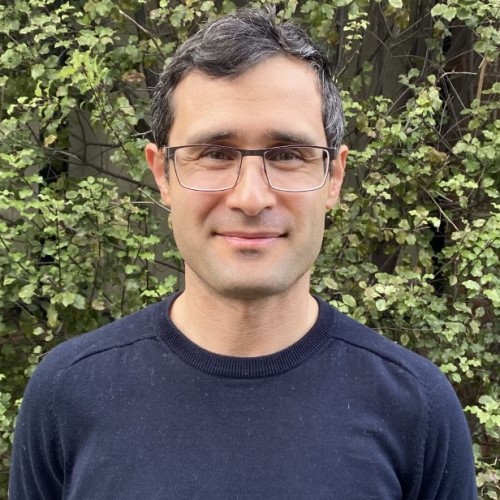
The Intelligent Informatics and Control (I2C) Research Group focuses on all aspects of intelligent data-driven modelling, control and optimisation in complex network environments, and their applications in industries such as energy, automotive, manufacturing, sociology and biology.
The research group has developed the state-of-the-art fundamental theory of engineering network systems. The theory has significant applications in safeguarding critical infrastructures such as smart grids and transport systems.
The research group has also developed innovative technologies to model and control renewable-rich smart grids. These technologies are critical in a smooth transition to clean energy, while keeping the reliability and security of the electricity supply under control. The team has delivered impactful applied research with direct benefit to society and industry.
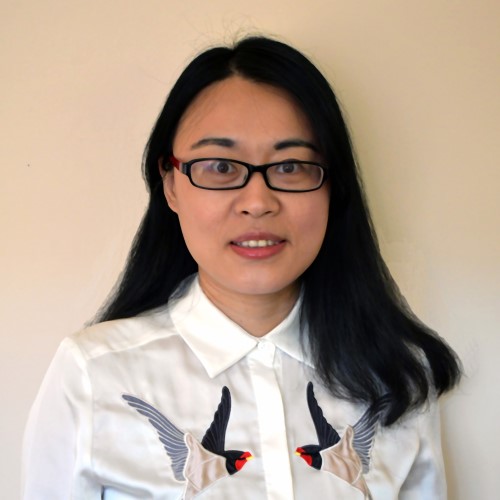
Associate Professor Rebecca Yang has supervised 20 HDR candidates to date and has jointly published 49 papers in high-ranking journals, conferences and industry reports. Rebecca is a Student Chapter Advisor on the International Council for Research and Innovation in Building and Construction, providing a support network for postgraduate students sharing research experiences.
Rebecca led the RMIT student chapter in securing funding to explore HDR employability in collaboration with four universities and improved the global disciplinary HDR network. She also has developed and delivered a stakeholder management module as one of four project management training programs to about 200 HDRs across RMIT since 2019.
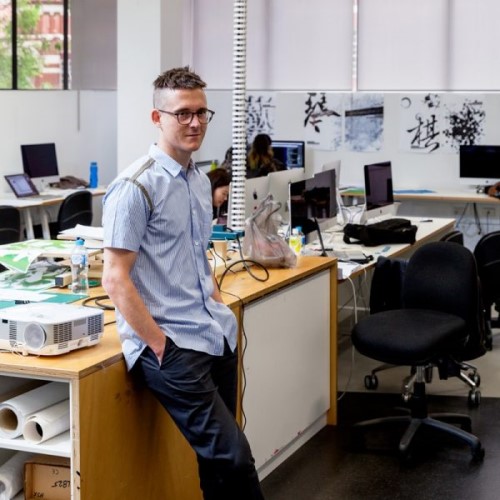
Associate Professor Brad Haylock is a designer, publisher, academic and coordinator of the School of Design's Higher Degrees by Research program.
Brad's research spans typography, publishing, and the sociology of critique. He has led numerous government- and industry-funded research projects and is the founding editor of Surpllus (an independent, para-academic imprint that focuses on critical and speculative practices across art, design, and theory). Brad is also the chair of the RMIT Practice Research Symposium in Australia.

Associate Professor Gillian Vesty, Deputy Dean L&T AISSC, CoBL strives for impactful research fostered by strong industry network connections. Striving to address wicked problems through innovative research designs, Gillian engages her students on research projects that expose challenging industry problems and generate research artefacts that encourage continued experimentation.
Gillian has guided her PhD students toward social impact research that address health and wellbeing challenges, such as resource constraints in the healthcare industry and in public hospitals where costs have burgeoned due to the pandemic or dealing with wellbeing literacy in the workplace. Taking a value-based healthcare perspective, her students have considered the emerging trends and the way different countries deal with preventative health to reduce the burden on society. Supported by industry partners, Gillian has ensured her HDR student research provides them with agile ways of working and job-ready skills that are recognised by employers.
For her academic career HDR students Gillian recognises that an important part of their research journey is the development of simulated artefacts in the form of serious games, that provide innovative vehicles to foster continued debate, provide educational insights and hybridised expertise along with a powerful vehicle for ongoing experimental research.
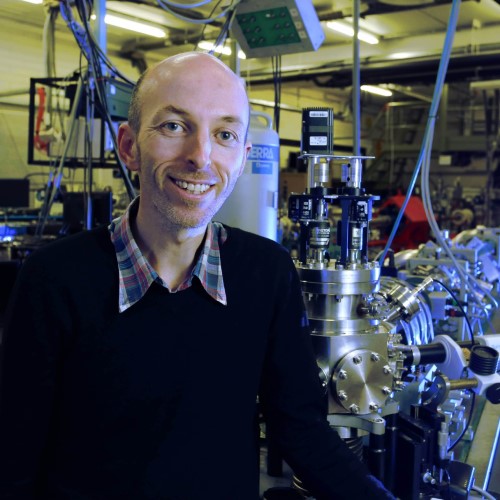
Dr Brett C. Johnson is a solid-state physicist recognised for his work on defects in semiconductors for applications in quantum technologies. His research focuses on the integration and read-out of two-level quantum systems in practical devices for quantum sensing and quantum computation.
Dr Johnson’s leadership in this field is evidenced by the publication of over 130 articles in top-ranking journals, plenary and invited presentations at various international conferences, and as a committee member for a number of prominent international conferences. He has developed strong international collaborations and attracted significant external funding to develop quantum technologies in Australia further.

Professor Daniel X. Harris is an ARC Future Fellow, previously ARC DECRA fellow, previously RMIT Principal Research Fellow, the Associate Dean, Research & Innovation, in the School of Education, and the founder and co-lead of the Creative Agency research lab. Daniel is the first and only transgender professor at RMIT University and their transdisciplinary creative research and scholarship reflects their intersectional approach.
Their research focuses upon matters of social justice, led by attention to creativity in education, gender, ethnic and sexuality inequalities, and mental health and wellbeing. They recently completed an RMIT VC Principal Research Fellowship (2021).
The urgent need for research excellence across these intersectional areas—particularly the role of creativity to transform social change through public pedagogy, activism, and creative education, is evidenced by the international uptake of Harris’ work and the growing call for more creative approaches to education and mental health research, and across community/industry partnerships, especially in the East Asian/Pacific region.

Associate Professor Mahdi Jalili, a former Vice-Chancellor’s Research Fellow and an Australian Research Council DECRA Fellow, is recognised nationally and internationally for his pioneering work in network science, machine learning and their applications in sustainable energy systems. Mahdi is a Fellow of Engineers Australia and a Senior Member of IEEE.
His research in network science, energy analytics and machine learning applications was extensively published and received over 5,700 citations with an h-index of 45. Since joining RMIT in 2014, Mahdi has received over $10M in research funding (including four ARC projects). He is currently leading a significant project ($5.197M in funding from the Victorian Government) to establish the first electric vehicle living laboratory in the southern hemisphere in the CBD Campus.
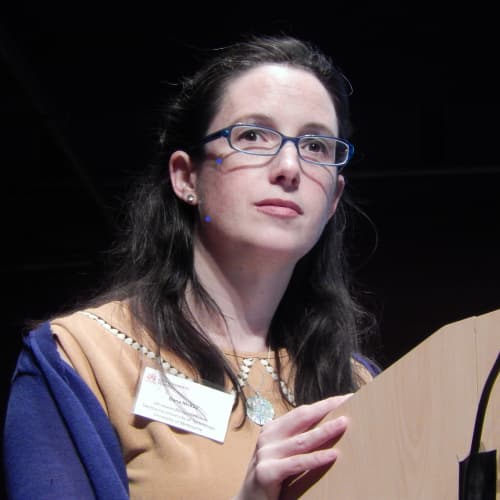
Dr McKay's research focuses on ensuring developments in information technology to make information access and spread fairer, more equitable, and more socially beneficial.
Dana is currently working on three major projects, including an investigation of online information in view of change; the role of technology in intimate partner violence (using technology as part of a pattern of abuse); and developing online systems for browsing information such as books, videos and news.

Dr John Doyle’s emerging research practice uses architectural design tools to explore innovative models for urban design. More recently, his research has focused on rapid urbanisation in megacities throughout Asia.
Working with colleagues in the School of Architecture and Urban Design at RMIT University and a network of architects, designers and artists from the region, his work has led to a critical reappraisal of urban density in Asia. This research has developed a series of high-density urban models to address the challenges related to climate change, equity, affordability, and food security. These models use emerging digital design tools to create alternative urban scenarios, and methods of city-making that continue to contribute to the multidisciplinary domain of urban research.
Dr Saima Ahmad’s research focuses on cultivating bullying-free, healthy and sustainable work cultures for employees and workers to thrive. She has made prominent contributions to knowledge in these fields by framing new models to build positive and sustainable work environments.
Ahmad makes a strong commitment to RMIT’s research environment through her active involvement in the HDR program at the College of Business and Law, Business and Human Rights Centre, and by bringing new partnerships and collaborations to RMIT. Her work is internationally influential, with more than 874 citations to her work in Google Scholar and more than fifteen thousand reads via ResearchGate alone.
As an RMIT ECR, she has co-authored 15 peer-reviewed articles in the last three years. She received the Emerald Literati award for outstanding paper in 2019. Saima serves on the editorial board of the European Management Journal and the advisory committee of the Australasian Business Ethics Network.
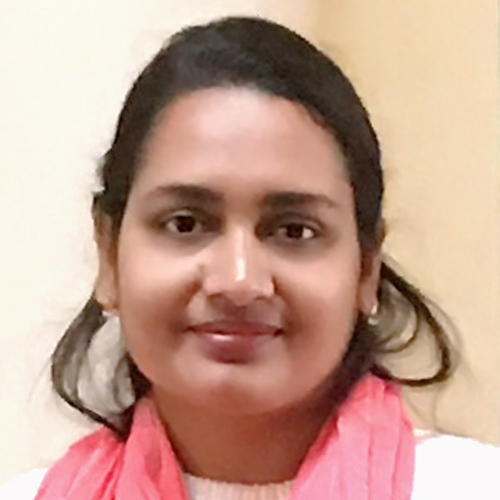
Dr Sumaiya's research explores the optical and electrical properties of phase change oxide thin-films for optoelectronic and electronic applications. She has successfully fabricated prototypes using the unique properties of phase change oxides and clever device engineering techniques. The multi-functionality of the devices she designed provides a significant technological advance using novel concepts, which contribute to improving integration density, speed, and energy efficiency in future electronics.
For her outstanding research, her work has been published in several top-tier journals and won several awards and prizes, including the Young Scientist Research Prize 2021 (2nd place in the Physical Science category) by the Royal Society of Victoria.

Dr Erik L'Heureux Faia is a Dean's Chair Associate Professor at the College of Design and Engineering at the National University of Singapore (NUS). A fellow of the American Institute of Architects and a tenured professor, Erik has taught and mentored students for more than 18 years. He is currently the Master of Architecture (Design) program director, teaching a new generation of architects to be committed to the complexities of architecture situated in the hot air of the equator.
Through his creative design practice, Erik specialises in designing for the dense equatorial city, using simple monolithic forms and delicate veils to calibrate buildings, interiors, and experiences to the equatorial climate in delightful and surprising ways. At NUS, he has led the transformation of the home of the Department of Architecture with the adaptive reuse of two 1970s buildings, creating pedagogical lessons in built form that link environmental and energy performance with design excellence.

Dr Nameer Al Khafaf completed his PhD in Electrical and Electronic Engineering, researching energy analytics to improve network operation and support decision-making. This timely research is a significant step in moving towards a decarbonised economy as an immediate action to prevent further global harm and damage from climate change inaction.
In addition to the social impact and industry benefits, Nameer has successfully contributed to policy on a government-funded project, covered by the Herald Sun. He published papers in leading academic journals such as IEEE Transactions on Industrial Informatics and Renewable Energy, as well as several other Q1-indexed journals and conference papers.
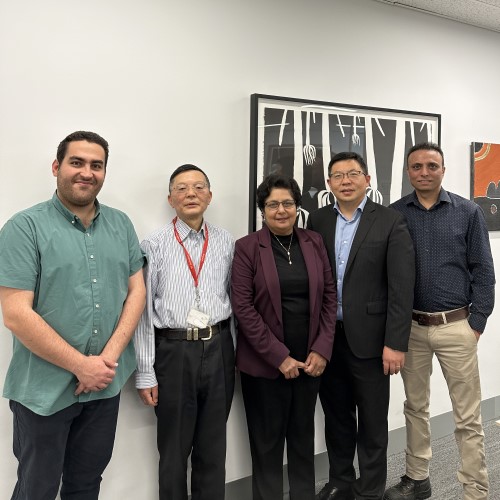
The Civil Engineering Research Team works with industries and government organisations to provide innovative solutions to address urgent problems related to waste materials and sustainability.
The team has developed several novel techniques and created demonstrable impacts, such as repurposing a wide range of waste materials for civil engineering applications, diverting waste materials from landfills, converting waste to resources (binders and aggregates), creating eco-efficient and low-carbon-footprint materials from waste, applying cutting-edge tools to resolve environmental issues, and adding value to waste.
The team’s outstanding research works have received exceptional media coverage, over 1700 coverage by News portals, including mainstream media and over 50 live radio programs in Australia and overseas.

Dr Jimeno is RMIT Principal Research Fellow with expertise in natural language processing and machine learning applied to the biomedical domain. Working with Telstra Health and local start-up Opyl, Jimeno has contributed to and led the research of a dashboard that allows residential aged care personnel to identify the areas of deficiency among the residents in residential aged care. This research allows for better placement of resources and decisions in residential aged care.
In collaboration with Opyl, Dr Yepes has been leading research on automatically determining characteristics of successful clinical trials, potentially greatly accelerating the safe development and release of new drugs to the public. This issue could have a significant impact and benefit public health and safety.

Anna Hickey-Moody is recognized internationally for designing innovative processes of research that assist vulnerable communities. She has developed new models of research co-design that enrich the lives of young members of disadvantaged communities.
Engagement with community across Australia and England has been at the centre of her prestigious ARC Future Fellowship research design. This process involved working closely with industry, particularly with public schools, community service providers, religious institutions, and charities.
Her Future Fellowship involved co-design with over 500 research participants in hard-to-reach communities. She engaged 13 cities in 6 cities in qualitative research, including ground-breaking forms of arts-based content creation. Her research outcomes have been taken up at federal level in developing Australian government anti-racism initiatives and distributed through publications and popular public art exhibitions in London, Manchester, Melbourne, and Adelaide. Anna is now developing new models for widening university participation through her ARC Linkage, where she is working with five industry partners to build pathways to further education and employment for youth.

Aiden Warren’s research in the area of international relations has made a significant policy impact in addressing global security threats pertaining to nuclear proliferation, US-China-Australian relations, the Indo-Pacific region, and issues relating to cyber, artificial intelligence (AI) and autonomous weapons.
As Fulbright Scholar in Australia-United States Alliance Studies and recipient of the Category 1 grant: Department of Defence, Strategy, Policy and Industry Group: ‘Assessing the Implications of Artificial Intelligence (AI) in a Trilateral Context,’ the quality and translative impact of his research has created ‘impact through collaboration’ and actions towards ‘solving global public policy problems.’
Warren has established himself as a global leader and prominent University interlocutor to Washington DC. He has a sustained translation of research to develop evidence-based solutions to real-world problems and has ensured the knowledge created by his research is clear and accessible, such that it has been embraced and applied by government end-users (U.S. Departments of State and Defense, Department of Foreign Affairs & Trade (DFAT), Department of Prime Minister & Cabinet) to achieve beneficial societal outcomes. This has paved the way for policy development and improvements in practice in terms of providing guardrails and governance mechanisms towards addressing key global security threats.

Dr Aaron Lane is a legal scholar and expert on blockchain technology's legal and economic implications. Aaron's conceptual and applied research has been leveraged to inform policy makers about the regulation of blockchain and crypto assets in Australia and internationally and has attracted great media coverage. His empirical research is currently being leveraged to provide doctrinal and practical insights to the legal profession and law enforcement community of cryptocurrency practitioners.
Dr Lane serves on the editorial board of Frontiers in Blockchain, is a member of the Digital Commerce Committee of the Law Council of Australia and was recently appointed to the Blockchain Expert Group of Business at OECD.

Dr Matthew Riley’s practice research encompasses experimental and speculative design, art practice and critical forms of play and has been recognised in exhibitions, conferences, symposia and events in Australia, the United Kingdom, Finland Portugal, Hong Kong, United Arab Emirates, New Zealand, France, Japan and Austria.
Matthew's urban and non-urban public projects have been situated in municipalities and sites across Melbourne, exploring how creative interventions shape places, communities and spaces.
He is currently a member of the Future Play Lab and lecturer in the Master of Animation, Games and Interactivity program at RMIT University.
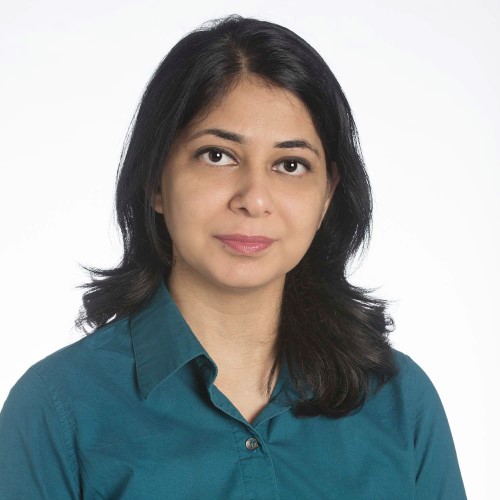
Dr Tabinda Sarwar’s research focuses on detecting and predicting health deterioration in residents of aged care facilities.The current methods of monitoring aged care home residents involve time-intensive assessments; hence it is crucial to timely identify poor health conditions in order to develop care and intervention plans to minimize the health risks.
Dr Sarwar's data-driven solution for tracking the health status of the residents is considered for Telstra Health's Resident Manager tool, which is utilised by over 350 facilities all over Australia.

Vuong is a recipient of the exchange PhD student scholarship, working for the H2020- MSCA-RISE project, and the best postgraduate student paper award at the 10th Australian Congress on Applied Mechanics 2021 Conference, organised by Engineering Australia.
During his candidature, Vuong developed a novel virtual computational framework for 3D concrete printing modelling and demonstrated the ability to combine 3D printing technology and recycled plastic to offer sustainable construction solutions.
His publications are in the top 1% of civil engineering journals.

Uyen Nguyen is an animator, designer and educator whose creative research practice develops sound-based works, public art, interactive installations, experimental games and urban play interventions.
As a PhD candidate in the School of Design, Uyen is researching how play can be harnessed as a design strategy for interaction with sound. Collaborating with leading artists, software developers, game makers, creative producers, research partners and cultural organisations, her gallery-based and site-specific works have been shared in national and international venues, events and exhibitions including Science Museum Oklahoma (USA), Kajaani University of Applied Sciences (Finland), Digital Games Research Association (Japan), Electronic Visualisation and the Arts (UK), St Pölten University of Applied Science (Austria), TarraWarra Museum of Art (Aus), Experimenta Life Forms (Aus)and Playable City Melbourne (Aus).
Her socially engaged practice has been shared with diverse community and professional networks and partners, disseminating expertise to public audiences through invited workshops, publications, interviews and presentations. Uyen’s research has impact and relevance for sonic interaction design, community and civic renewal, public space, social well-being, urban planning, place-making and creative technologies. Uyen is a lecturer in the Master of Animation, Games and Interactivity (RMIT), a member of the Future Play Lab and works in the collective YomeciPlay.
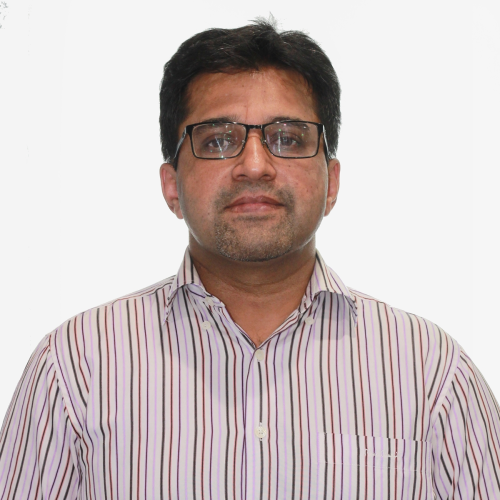
Dr Anwar explored policy texts, interviews and field observations to develop an innovative analytical approach entitled postcolonial Islamic governmentality. Javed's PhD research has made significant contributions to the field of gender equality and education, especially for young female learners in Pakistan.


RMIT University acknowledges the people of the Woi wurrung and Boon wurrung language groups of the eastern Kulin Nation on whose unceded lands we conduct the business of the University. RMIT University respectfully acknowledges their Ancestors and Elders, past and present. RMIT also acknowledges the Traditional Custodians and their Ancestors of the lands and waters across Australia where we conduct our business - Artwork 'Sentient' by Hollie Johnson, Gunaikurnai and Monero Ngarigo.
Learn more about our commitment to Indigenous cultures